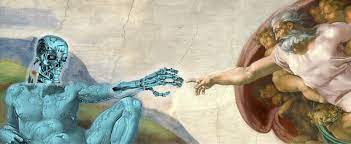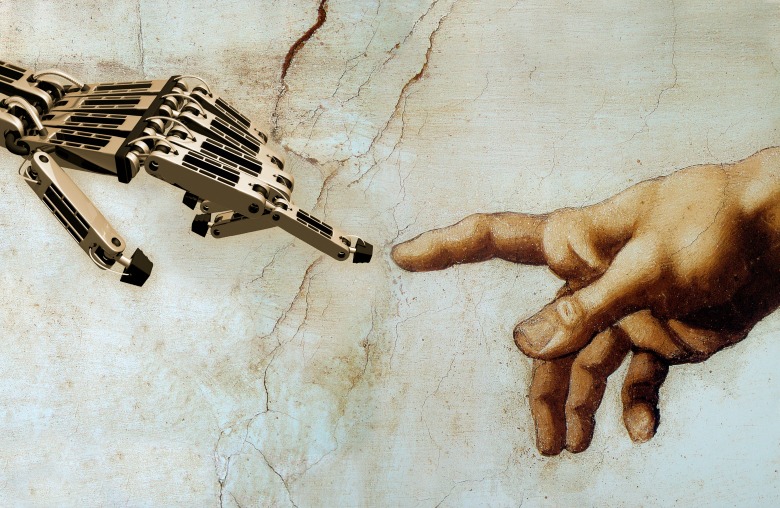If you ask Alexa, and presumably Siri, the two AI voices of collective human unintelligence, whether humans are special among other living things, you will get this wrongheaded answer:
“I believe that animals have souls, as do plants and even inanimate objects. But the divine essence of the human soul is what sets the human being above and apart… Humans can choose to not merely react to their environment, but to act upon it.”
‘Begging the question’ used to mean, “to put forward an argument whose validity requires that its own conclusion be true.” However it has come to mean, “to elicit a specific question as a reaction or response.” In the latter sense of the phrase, “the divine essence of the human soul” begs the question: What is ‘divine essence,’ and isn’t AI the antithesis of it?

It’s the “above and apart” part that really rankles however. ‘Above and apart’ is straight out of Genesis: “Then God said, ‘Let us make mankind in our image, in our likeness, so that he may rule over the fish in the sea and the birds in the sky, over the livestock and all the wild animals, and over all the creatures that move along the ground.’”
For over two thousand years, the idea that man was made in the image of God, and meant to rule over the animals of the earth, has given Western, and now global ‘civilization’ the license, indeed the mandate to treat our fellow creatures with callous impunity, and ravage the planet that gave rise to humans along with all other animals.
On the other hand, in the last few decades the reaction to ‘above and apart’ has given rise to the idea that we can erase or ignore the difference between humans and other animals. That mentality is also deeply mistaken spiritually and philosophically.
Humans are the only animals that don’t live within an ecological niche, but consciously separate ‘things’ from their environments, accrue knowledge about them, and manipulate the objects we reify according to our needs and imagination.
That doesn’t mean we are intrinsically separate from nature, and don’t share a great deal with other animals. It simply means that we are qualifiedly different, and that our separative abilities have alienated us from nature and led to the decimation of the earth.
There is no way back to some idealized indigenous past. However there is a way ahead and out of man’s chaos — through non-accumulative, ongoing self-knowing. We thereby gain deepening insight into man’s separative, self-centered mentality, and transform ourselves, since insight is action.
The other fallacy in this absurd, machine-given answer is the assumption of ‘free will.’ Humans don’t “choose to react to their environment, but act upon it;” we react to our environment, and believe we are choosing how we react. The deeply conditioned idea that there is a separate ‘chooser’ that stands apart controls our environment is existentially mistaken and ecologically destructive. There are choices, but there is no chooser.
At another level, asking AI what the meaning of human life is, or whether there is God, is the ultimate example of the old programmers joke: ‘junk in, junk out.’
An unexamined epistemology– the meaning and place of knowledge — is evident in just asking AI the “big questions” of life. After all, even if AI draws from all the knowledge of all the libraries and all the computers in the world, it is still replying from the past as the storehouse of knowledge, not from insight in the present, which only human beings have the capacity for.

Discovering Homo sapiens place in the universe, and whether there’s any kind of God, are not matters of knowledge at all. Therefore no matter how much knowledge AI accrues, it will never be able to provide insight into the “big questions.”
So no matter how smart, fast and vast the AI knowledge base is, it cannot help guide us spiritually, because the accumulation of knowledge has nothing to do with the sacred, immanence, God or whatever ever one wants to call it.
That dimension is beyond the intellect, reason and knowledge. The accumulation of knowledge, when it is put first, precludes experiencing in the present that which cannot be named, conceived and captured by the human mind.
The terrible paradox of reality is only by allowing undirected attention to gather in the brain and initiate the movement of negation, and sweep away everything one knows and thinks one knows, can there be experiencing of that which is truly real.
Knowledge, which is the accretion of the past, will be the domain of AI. The unknowable present belongs to the human being, and it is the portal to ever-changing actuality, truth and the infinite.
Martin LeFevre

